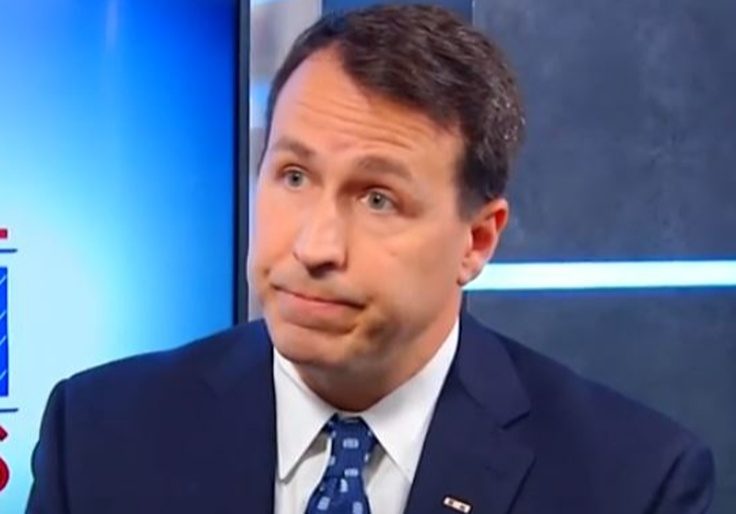Two establishment-backed Democratic candidates face accusations of illegally coordinating with a liberal dark money group, according to ethics complaints filed as voters prepare to cast ballots in the Super Tuesday primaries.
VoteVets has spent tens of millions of dollars backing Democrats in key 2020 Senate races, including Cal Cunningham in North Carolina and M.J. Hegar in Texas. The dark money group spent over $7 million supporting the pair in February. The seven-figure ad blitz has helped Cunningham and Hegar secure their frontrunner status ahead of contested Super Tuesday primaries. The ad blitz also drew scrutiny from watchdogs who accuse Cunningham and Hegar of illegally coordinating with the dark money group in ethics complaints obtained by the Washington Free Beacon.
Campaign photos and videos released by Cunningham and Hegar were later used in VoteVets ads. The short turnaround suggests "coordination with an outside organization," which is illegal under campaign finance law, according to the complaints, which will be filed on Tuesday.
Charges of wrongdoing are hardly new for VoteVets. In February, Sen. Elizabeth Warren (D., Mass.) accused the group of "exploiting our broken campaign finance laws" through its support of former South Bend mayor Pete Buttigieg. Sen. Gary Peters (D., Mich.) was also accused of illegally coordinating with the group in December. The repeated allegations call into question VoteVets' legitimacy as an organization, according to Foundation for Accountability and Civic Trust executive director Kendra Arnold.
"VoteVets is pumping millions of dollars into political campaigns throughout the country—from Senate races in Michigan, North Carolina, and Texas, to the presidential campaign of Pete Buttigieg," Arnold said. "Evidence gathered by FACT suggests that many of the ads that VoteVets has been running on behalf of these candidates were the result of illegal coordination, calling into question the entire scope of VoteVets' activity and the legality of their actions."
VoteVets did not respond to a request for comment.
Cunningham and Hegar have each spent more than $3 million to win the Democratic nomination in crowded primary fields. Outside spending takes on even more importance in such closely contested races, as it allows candidates to save funds for the general election.
The FEC has largely failed to enforce coordination complaints in recent years, and both Cunningham and Hegar have vowed to fight the same campaign finance loopholes they are now accused of exploiting. Cunningham's corruption plan promises to reform the FEC "so it can carry out its watchdog function over our elections, instead of letting the current gridlock create loopholes for those willing to violate campaign finance laws and get away with it." Hegar has touted an endorsement from End Citizens United PAC, a liberal group that focuses on campaign finance reform.
The Cunningham and Hegar campaigns did not respond to requests for comment.
VoteVets has emerged as a key power broker in progressive politics. Since its 2006 founding, the group has spent more than twice as much money on elections as long-standing liberal groups NARAL Pro-Choice America and Sierra Club combined. While the group characterizes itself as a "grassroots" organization, a Center for Responsive Politics review of VoteVets' 2014 tax documents revealed that the group receives most of its funding from labor unions and fellow liberal dark money groups. America Votes has given VoteVets $775,000 since 2011, and the group received $2 million from labor groups, including the United Brotherhood of Carpenters and AFL-CIO in 2013 and 2014 alone.
Though VoteVets downplays its progressive nature—its mission statement makes no mention of a partisan goal and prioritizes "matters of national security"—the group has spent tens of millions of dollars backing Democrats and no money supporting Republicans. Some of its 2020 ads have failed to discuss foreign affairs, instead touting candidates based on their progressive views on issues such as health care.
"[Cunningham] will fight to guarantee coverage for preexisting conditions, take on drug companies jacking up prices, and work to finally expand Medicaid," a February VoteVets ad said.
Both Cunningham and Hegar are expected to win their respective primaries Tuesday, and VoteVets will no doubt continue to boost the Democrats to make up for their fundraising disadvantages. Sen. Thom Tillis (R., N.C.) holds $5.4 million on hand compared with Cunningham's $1.5 million. Sen. John Cornyn (R., Texas) has $12 million on hand compared with Hegar's $850,000.
